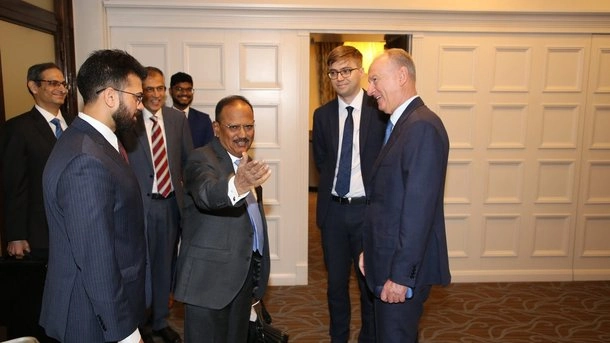National Security Advisor (NSA) Ajit Doval held talks with his Russian counterpart Nikolai Patrushev in Moscow on Wednesday as India takes a sharper look at Eurasia.
The meeting between the two top security officials took place hours before the two-day 17th annual meeting of the Security Council Secretaries of the Shanghai Cooperation Organization (SCO) member states kicked off in Tashkent today.
Another signal of India's interest in bonding with Russia came from Bangkok where External Affairs Minister S Jaishankar was paying a visit.
Asked about India's crude oil imports from Russia despite western opposition because of the Ukraine crisis, Jaishankar asserted that India had signed the "best deal" with Moscow.
"We have been very open and honest about our interest. I have a country with a per capita income of USD 2000, these are not people who can afford higher energy prices. It's my moral duty to ensure the best deal," said Jaishankar.
It is obvious that Afghanistan and Ukraine – standard items on the global agenda – would have been discussed at the Doval-Patrushev meeting.
In the past the Russians have also been nudging India for a Russia-India-China (RIC) Summit – something India has rejected because of the Chinese intrusions in Ladakh.
The readout from Moscow, however, did not reveal much.
"A wide range of issues of bilateral cooperation in the field of security, as well as topical issues on the regional and international agenda, were discussed," said a statement from the Security Council of the Russian Federation.
"The parties agreed to continue the dialogue through the security councils of both states, emphasizing the progressive development of the Russian-Indian especially privileged strategic partnership," it added.
Both NSA Doval and Patrushev, the 71-year-old former Director of Russia's Federal Security Service (FSB) who is currently serving as the Secretary of the Russian Security Council, have remained in constant touch at a time when major changes are taking place in the region.
In May, the two seasoned security experts had met on the sidelines of the 4th round of multilateral consultations on the Afghan problem held in Dushanbe, discussing the whole range of problems related to the development of the situation in Afghanistan as well as specific practical measures to counter the challenges and threats emanating from the Afghan territory.

In March, the two had discussed over phone the state and prospects of Russian-Indian security cooperation.
Highlighting the Kremlin's emerging focus on the Indian Ocean region, Patrushev had also visited India twice in three months last year – first in September and then again in November to attend the 'Delhi Regional Security Dialogue on Afghanistan' – during which he not only held meetings with NSA Doval, External Affairs Minister S Jaishankar but also called on Prime Minister Narendra Modi.
As reported by IndiaNarrative.com earlier, Russia and India continue to strengthen their ties despite the slew of anti-Moscow sanctions which have been imposed due to the ongoing conflict in Ukraine.
Emphasising that Moscow remains grateful to New Delhi for its "objective assessment of the Ukrainian events", Denis Alipov, the Russian Ambassador to India, had said in an interview last month that New Delhi understands the background of the present geopolitical and geo-economic situation and the "forced nature" of Russia's actions in Ukraine.

"India does not support attempts to isolate Russia in multilateral forums and is critical of the West's wish to reduce the international agenda to the conflict in question, ignoring other key global and regional problems, which the West itself has exacerbated significantly. The pressure exerted by the West, aggressively imposing its conditions about who one can and cannot be friends with, causes the rejection of such diktat," Alipov told Russian state-owned news agency Sputnik.
Besides expanding the military and military-technical cooperation, the two countries have also maintained the momentum in bilateral trade which amounted to $6.4 billion from January to April 2022 – almost twice as much as for the same period last year.
Also Read: Russia says India can make a significant contribution to stabilise Afghanistan




















